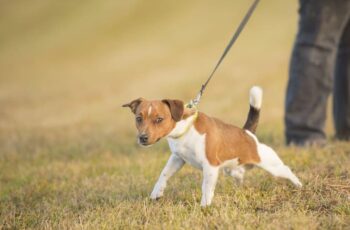-
Small Dog Place Home
-
A to Z Breed List
-
Chinese Crested Powderpuff
›
›
>
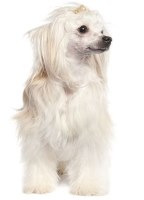
The Chinese Crested Powderpuff maybe one of those best-kept secrets of the dog
world—gentle, happy, loving and totally devoted to his owner.
Many
people label their small breed dog a Velcro dog because they tend to
follow you everywhere, and no dog deserves this description more than
the Chinese Crested.
Many people know the breed through their notoriety in the annual Ugliest Dog Contest. However, that does not begin to do the breed justice.
Sometimes affectionately called the Dr. Seuss dog because the hairless variety can resemble some of the unusual characters imagined by the famous children’s author and illustrator.
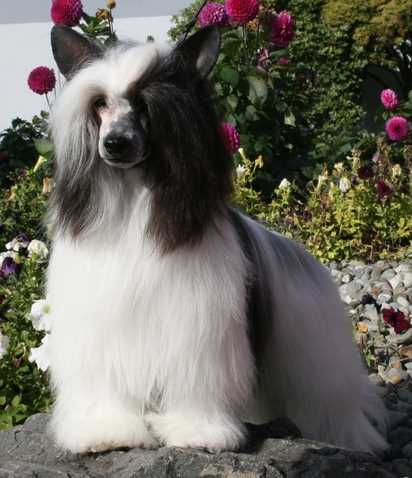
There
are two varieties of this breed, the hairless and powderpuff. They are
both members of the same breed although they look vastly different.
Genetically there is no difference, and both hairless and powderpuff
varieties occur in the same litter.
Slight boned and delicate, these dogs have often been described as cat-like. They “perch” on the back of a sofa, on your lap, or share your pillow at night. If cold, they are just as likely to borrow under the covers with you.
On both
varieties, their ears can be up or down. Show dogs must have erect ears
and breeders or owners may tape the ears if they do not stand up on
their own. Pet owners can decide whether they want the ears up or down.
Both varieties do not do well in the cold. The hairless, in particular, will need coats in the winter, but even the powderpuff will appreciate a warm sweater or coat in severe weather.
They seem to do better in the heat, but either way, they must always be considered inside dogs. Never leave a crested outdoors.
Chinese Crested Powderpuffs are people dogs and do not do well if separated for long periods of time. If left alone, they can suffer from separation anxiety and become barkers or destructive.
Their sensitive nature sometimes makes them difficult to train unless you are patient and very gentle in your methods. Like many small breed dogs, housebreaking usually takes longer, and many will relapse from time to time.
The Chinese Crested powderpuff variety has a silky, thick double coat that consists of a straight silky outer coat and a short wooly undercoat.
Beyond the outward appearance, there is little else to distinguish the two varieties of the Chinese Crested.
Quick Facts about the Chinese Crested Powderpuff
Other Names Used: Chinese Hairless, The Chinese Edible Dog, Chinese Ship Dog, and Chinese Royal Hairless (These names are not used today); Crested, Puffs, Hairless
Affiliation: AKC, CKC, KC, NZKC: Toy Group, UKC Companion Breeds
Size
Height: 11-13 inches (28 -33 cm.)
Weight: 10–13 lb. (4.5–5.9 kg)
Coat Type: Powderpuff variety has a thick double coat
Colors: Colors recognized by the AKC: Apricot, Black, Black, White and Tan, Blue, Chocolate, Cream, Palomino, Pink, and Chocolate, Pink and Slate, White, Black and Tan, Black and White, Brown, Pink, Red, Sable, Silver, White and Black, White and Chocolate
Country of Origin: Africa or China
Activity Level: Moderate
Life Expectancy: 12 to 14 years; some live much longer
Good with Children: Yes
Good with other Pets: Yes
History
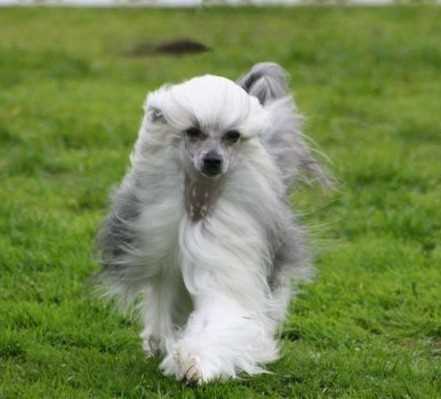
No early written historical records exist concerning the origins of this
breed, so theories and speculation have filled in the gaps.
One theory
suggests that the Chinese Crested can trace their ancestors back to the
African hairless dogs.
These small dogs were traded by merchants and sailors that traveled from port to port, making their way to China. The Chinese loved small dogs and bred these hairless dogs to other dogs reducing the size and creating a new breed.
There is evidence that by the 1500s, Chinese traders purchased these dogs from either Mexico or Africa and then sold them to other ports around the globe.
By the 1800s, the Chinese Crested appeared in ports in Central and South America as well as Asia.
It is thought that these dogs were regular passengers on old sailing ships, helping to catch vermin and may have been around to help control rodents responsible for carrying the plague.
The Chinese Crested, hairless variety was used as a type of hot water bottle for those sailors suffering from ailments requiring warmth.
Lastly, when food stores ran low, these dogs served as meals for the sailors thereby earning them the title, Edible Dog.
When dog shows became fashionable in the late 1800s, an occasional Chinese Crested was among the dogs exhibited.
Throughout the first half of the 20th century, these dogs were being shown by enthusiasts especially ladies prominent in the entertainment industry.
The breed was accepted into the Miscellaneous Class of the American Kennel Club in 1955 but not fully accepted as a breed until 1991.
Personality of the Chinese Crested Powderpuff
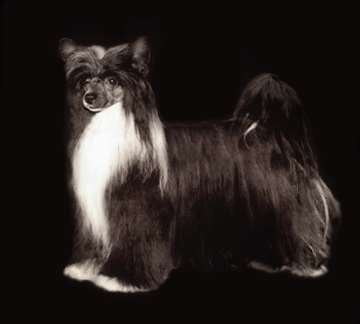
Look at a picture of a Chinese Crested Powderpuff, and you might think he is
smiling at you. Whether they actually smile or just show off their lovely
face, this breed showers his owner in love and devotion.
If you are the
proud owner, you will have a loyal companion, but remember they are
rather sensitive, so only a gentle touch will be acceptable by these
dogs.
The Powderpuff is a highly social dog and does not do well if you leave him alone for long
periods of time. They can often be “needy” of your attention but shy
around strangers.
They do great with courteous, respectful children and get along fine with other pets.
Although
they may be the ultimate cuddle bug, they are active, entertaining, and
playful. These dogs are a little timid around strangers, so puppy
socialization is most important.
An occasional walk will do him
fine, but they can get all the exercise they need indoors by playing and
following his owner from room to room.
They do well in agility,
obedience, lure coursing and conformation. They also enjoy a lively
game of fetch now and again.
Their quiet nature and their slight
energy needs make them an ideal companion for a city or apartment
dweller.
But, because they are so flexible, they also do equally well
in the country or rural areas as in the city.
Grooming the Chinese Crested Powderpuff
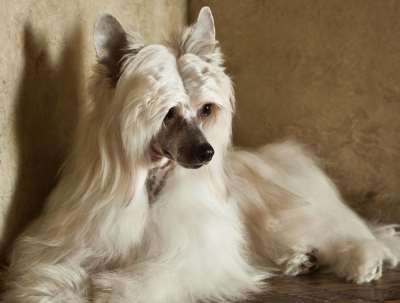
Both varieties require grooming, but the Chinese Crested powderpuff needs more. Their
double coat continues to grow to be quite long.
There is little
shedding, so that you will not find hairs around your home, but this
means that the coat can mat easily.
These dogs need daily brushing.
Before brushing, mist the hair with a spray on conditioner. This will
prevent hair breakage and reduce the static electricity that often
occurs in dry climates.
Since shedding is minimal, these dogs are
considered hypoallergenic and might be perfect for allergy sufferers.
Non-show
puffs are often clipped into a “Pony” cut that leaves long hair on the
bottom of the legs, tail, and head, commonly called the crest.
Nails
should be kept short, but the “quick” or blood vessels running through
the nails are longer on the Crested than other breeds.
Long
quicks result because they have a different shape of the foot often
called a “hare foot.” Hare foot, as the name implies resembles the foot
of a rabbit—longer and thinner than the average dog
foot.
A weekly bath is often recommended to keep them looking and
smelling fresh.
The Chinese Crested powderpuff variety does not seem to share the same
skin problems as the hairless, so no need for sun block and acne is
usually not an issue.
They need their ears checked periodically and
wiped clean with a cotton ball. If there is any redness or odor, it is
time to call the veterinarian. Red, odorous ears are associated with
infections.
Teeth should be brushed ideally daily but weekly is
highly recommended.
Health Concerns of the Chinese Crested Powderpuff
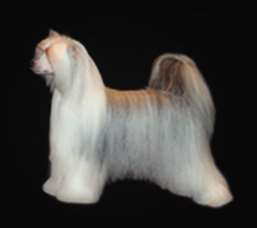
They are a healthy breed but like many other small breed dogs, they can be affected by genetic diseases.
Eye problems are among the most common complaint of Puff owners. Two forms of Primary Lens Luxation have been identified in the breed, as well as glaucoma and Progressive Retinal Atrophy (PRA).
There are genetic tests currently available for one form of PRA and Primary Lens Luxation. The tests will only determine if the sire or dam is a carrier, is clear or is affected. It is not fool foolproof, but responsible breeders will have their crested dogs’ eyes check routinely.
Another eye problem that can occur is called
Keratoconjunctivitis sicca or dry eye syndrome.
They are also prone
to several skeletal problems such as Luxating patella and Legg-Perthes
Disease, two very common conditions in small breed dogs.
Pros
- Family friendly dogs, good with children and other pets
- Relatively quiet breed, good for apartment dwellers
- Playful, loving, devoted companions
- Small size, makes them good for retirees who enjoy travel
- Relatively healthy breed
- More hypoallergenic, good for allergy suffers
Cons
- More grooming required than their hairless sisters and brothers
- Training requires very gentle approach
- Not good for people who work long hours
Did You Know…
A famous blind Chinese Crested Dog, Sam was the winner of the World’s Ugliest Dog Contest from 2003 through 2005; Chinese Crested dogs have also won this contest in 2007, 2008, 2011, and 2012.
In addition to their notoriety in Ugly Dog Contests, these dogs
have been featured in many movies and television shows such as…
Cats and
Dogs
102 Dalmatians
Hotel for Dogs
Marmaduke
New York Minute
Breed Club and References
Chinese Crested Breed Club
If you are serious thinking about adding a Chinese Crested to your household, you will want to know as much about the breed as you can. Here are some great reads that will help you on your path to dog ownership.
Similar Breeds
If you found this article helpful, you might want to check out these similar breeds.
Does This Article Deserve Your Thumbs Up?
We always appreciate your support and encouragement. Your thumbs up means so much to us. Please like this article.
If you find this page or any page on Small Dog Place Helpful, or Useful in anyway, I’d love it if you would click the small heart found on the bottom right of each page.
You can also share or bookmark this page — just click on the:

Free Monthly Newsletter
Sign Up for Our Free Newsletter and get our Free Gift to You.
my E-book, The Top 10 Mistakes People Make When Choosing a Dog (and how to avoid them)


